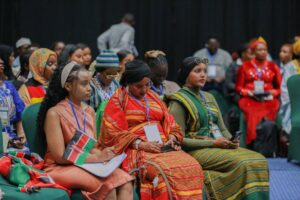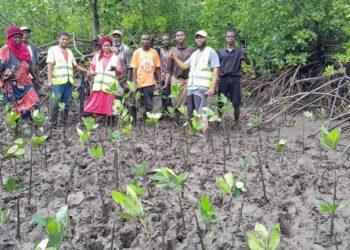Africa’s Youth Lead the Charge for Climate Justice at Addis Ababa Assembly _ Addis Ababa, Ethiopia – Hundreds of young African leaders gathered in Ethiopia’s capital this week to make a resounding statement: Africa’s youth are ready to lead on climate action. The Africa Youth Climate Assembly, held from September 5–7 at the Addis International Convention Center, served as a precursor to the Second Africa Climate Summit, placing young voices at the center of continental climate discussions.
During the opening address, Dr. Mithika Mwenda, Executive Director of the Pan African Climate Justice Alliance (PACJA), called on young Africans to unite and actively shape their continent’s climate future.
A Continent Facing Climate Injustice
Dr. Mwenda highlighted Africa’s disproportionate share of the climate burden. Although the continent contributes less than 4% of global greenhouse gas emissions, it faces severe climate impacts. In 2024 alone, over 110 million Africans were affected by extreme weather events, including droughts, floods, and cyclones.
“Climate injustice is not just about rising temperatures,” Mwenda told the assembly. “It is about shrinking opportunities, farmers who can no longer rely on the rains, and young people forced to migrate because the land can no longer sustain them.”
The Role of the Youth Climate Assembly
The three-day assembly emphasized the central role of young Africans in shaping climate policy. Dr. Mwenda urged delegates to focus on three key priorities:
- Building a united youth movement across the continent.
- Innovating grassroots climate solutions to address local challenges.
- Claiming decision-making roles in climate negotiations rather than settling for observer status.
Drawing parallels to historical African liberation movements, he reminded the delegates that transformative change has always been driven by youth energy, citing examples from anti-apartheid struggles to renewable energy innovations sweeping the continent.

Youth as Drivers of Transformation
Participants represented diverse backgrounds, including tech innovators, environmental activists, agricultural experts, and renewable energy entrepreneurs. Many are already implementing local climate solutions, such as solar mini-grids, reforestation projects, and climate-smart agriculture initiatives.
Key priorities outlined for youth leaders included:
- Securing climate finance as investment, not charity.
- Expanding energy access for the 630 million Africans still without electricity.
- Creating millions of green jobs through just transition policies.
From Token Participation to Central Leadership
The assembly marks a shift in African climate governance—from symbolic youth involvement to meaningful participation. With Africa’s population projected to double by 2050, and young people forming the majority, empowering youth leadership in climate action is no longer optional—it is critical.
From Recommendations to Policy Influence
Youth delegates’ insights will feed directly into the Africa Climate Summit, influencing discussions on climate finance, renewable energy transitions, sustainable agriculture, and adaptation strategies for vulnerable communities. Working groups throughout the week focused on energy access, finance, agriculture, and green jobs, culminating in a final declaration that is expected to shape both the summit outcomes and Africa’s positions at COP30 in Brazil.
For many participants, the assembly represents their first major platform to influence continental climate policy, underscoring the importance of intergenerational leadership and Africa’s commitment to driving its own climate agenda.
As the continent prepares for the main summit and looks toward COP30, one message is clear: Africa’s youth are not waiting for permission—they are shaping the future of climate justice on their own terms.
Africa’s Youth Lead the Charge for Climate Justice at Addis Ababa Assembly







